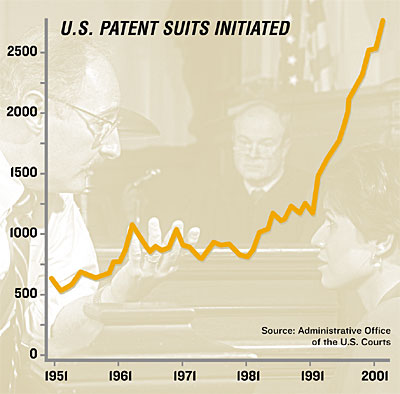US patent laws are broken. Adam B. Jaffe and Josh Lerner say so. Their IEEE article is filled with equal measures of anecdotes and facts about why patent law is doing more to limit advancement in the arts and science than to support it. And that isn’t just wrong, it’s unconstitutional.
There are a lot of ways to interpret the US Constitution, but Article 1, Section 8 is quite clear: “To promote the progress of science and useful arts, by securing for limited times to authors and inventors the exclusive right to their respective writings and discoveries.” The framers could have written “to maximize profits of established big business…” but they didn’t. As they wrote it, the government’s responsibility in drafting intellectual property law rests on the framer’s interest in promoting progress in arts and sciences.
I might be getting a little ahead of myself. First, let’s see what Jaffe and Lerner are saying:
Albie’s Foods Inc., a small grocery and catering company in Gaylord, Mich., received an unusual letter in 2001 from the law firm representing jelly giant J.M. Smucker Co. The letter accused Albie’s — which sells pastries and sandwiches in northern Michigan — of violating Smucker’s intellectual property by selling crustless peanut butter and jelly sandwiches.
In particular, Smucker’s claimed that Albie’s had infringed Smucker’s recently granted U.S. Patent No. 6,004,596, which gives the Orrville, Ohio, company broad protection on its “sealed crustless sandwich.” In a move that undoubtedly surprised the jam magnates, Albie’s decided to defend itself in federal court. Albie’s law firm noted in its filings that the “pasty” — a meat pie with crimped edges — has been popular fare in northern Michigan since the immigration of copper and iron miners from Cornwall, England, in the 19th century.

A battle in federal court over peanut butter and jelly sandwiches may seem merely funny and a little pathetic. But it is symptomatic of the larger and more profound problems with the U.S. patent system. We have reached the point where serious lawyers are being paid serious fees by a big company to shut down the PB&J operation of a grocery store.
Albie’s case was unusual, Jaffe and Lerner says, both because the company fought the charges but also because Albie’s won. There were fewer than 800 patent infringement lawsuits in 1981, but that number ballooned to nearly 3,000 in the year 2003. At the same time, the likelihood the courts would rule for the patent-holder rose from 62% to 90%. As patent law is increasingly becoming a mechanism to eliminate legitimate competition, it’s big businesses that are reaping the benefits of these changes.
Copyfight points out United States Patent 4,022,227, “a method of styling hair to cover partial baldness using only the hair on a person’s head.” There are two stories here, one is that there’s a patent on the “comb-over,” the other is that Donald Trump is clearly violating the patent. You see, the US Patent and Trademark Office isn’t supposed to issue patents for things that aren’t new, but it happens. So, even though men like Trump have been doing the comb-over for years, long before the trademark was ever issued, Frank and Donald Smith have claim against them. And, unlike criminal law, the responsibility is on the defendant to prove that the patent is invalid.
Software Patents Muck Up Waters More
The US allows software patents, but the EU does not — for now. A law to create software patents in the EU looked to be a done deal until the Polish delegation blocked it.
Debate there is raging, and some of it can be seen in a story in The Guardian that notes “Bill Gates wants software patents to protect his profit, not the public.” The story begins with Gates assertion that those who oppose expansion of intellectual property laws are ‘communists,’ but concludes that his words are so much hyperbole. Microsoft’s real interest is in strangling competition:
No law of nature says that companies have to stay profitable just because they were in the past. This is a problem for the whole software industry, but the solution Gates favours is bad for all of us. This is to get governments to supply the missing law and to ensure that Microsoft and other large companies will be profitable for ever, at the expense of any smaller, newer, hungrier ones. Software will be protected not just by copyright, but by patents. This makes about as much sense as patenting jokes.
And here’s the kicking irony: Copyfight has a quote from Gates himself from 1991:
If people had understood how patents would be granted when most of today’s ideas were invented and had taken out patents, the industry would be at a complete standstill today…A future start — up with no patents of its own will be forced to pay whatever price the giants choose to impose.
A lot can change in 14 years, but Bill’s understanding of how patent law can limit competition and choke innovation hasn’t.